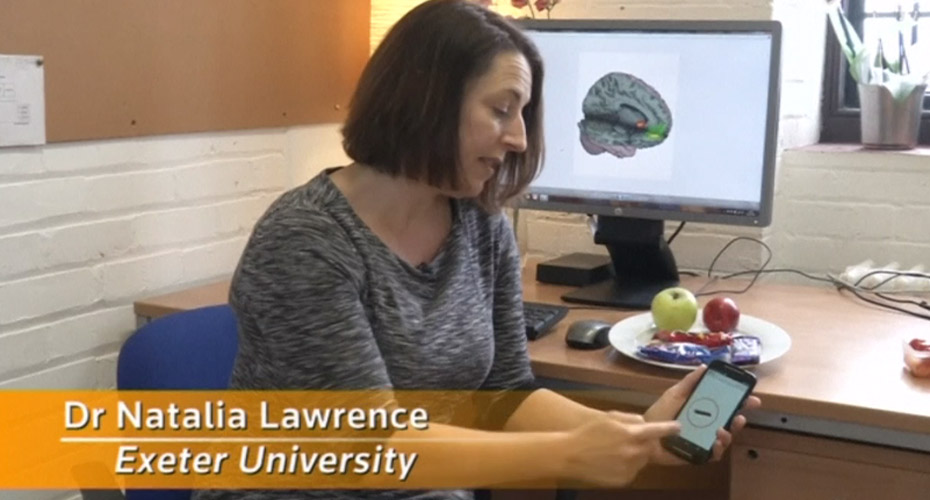Download the FoodT app now
About the FoodT app
About FoodT
FoodTrainer (FoodT) is a simple game - backed by researched - that trains your brain to stop to certain unhealthy foods or drinks. Repeatedly playing this game builds up associations between certain foods and stopping, effectively putting the brakes on your eating behaviour.
The app can now be tailored to meet your own dietary goals. For example, in addition to reducing the appeal of high fat/sugar foods, the game can be customised to help you cut down on meat or alcohol, or anything you like! Our new feature allows you to add your own photos into the game to make it work for you.
Our research suggests that playing this game reduces cravings for foods like chocolate, making them easier to resist and reducing how much is eaten. The brain training was developed by a team of Psychologists from the Universities of Exeter and Cardiff who have shown that this training reduces food intake in lab experiments (Lawrence et al., 2015a) and in the real world (Lawrence et al., 2015b). To find out what they've discovered in fifteen years' research, check out the FoodT Research Timeline.
If you don’t have an android smartphone or iPhone and would like to try the food training game you can also play online.
The FoodT app has been developed in partnership with Psynovigo and was funded by the Wellcome Trust and University of Exeter.
Using the FoodT app
To start playing FoodT we recommend you place your phone on a desk or surface in front of you in landscape mode. Try to play FoodT when you are alone, in a quiet environment, and before a meal as it may be important that you are hungry when playing to maximise its effects.
Images will flash up on the left, right or centre of your screen and your task is to tap on the image with your index finger as quickly as possible. You will win points for correct tap responses and lose points for incorrect tap responses:
- If the image has green border around it, you need to tap on the image– this will win 1 point.
- If the image has a red border around it you should withhold your response and try to stay as still as possible. If you tap on an image with a red border you will lose 1 point.
You should try to respond as quickly and accurately as possible. You will see your score and average reaction time at the end of each short block of training and at the end of each training session. Try to keep improving your reaction time! We recommend you do one training session a day for one week.
Before you start you have the option of selecting which categories of images you would like to train yourself to inhibit responding too. Please try to select categories of foods/drinks that you struggle to resist and would like to cut down on. You can select up to three categories. Alternatively you can leave the game with the default settings, which train you to inhibit responding to commonly eaten high-calorie snack foods (chocolate, cakes, biscuits and crisps).
App food image database courtesy of Adrian Meule and Jens Blechert with creative design Mike Krage.
Collecting research data
The FoodT brain training app asks you to identify three types of food and drink you want consume less and then to press on the item on the screen when it’s in a green circle and not when an item is in a red circle. The app is based on a similar online game, which was shown to reduce users’ food intake and weight after playing the game four times.
The app asks you a few questions before and after you play so our research team can see whether it helps you reduce your food intake, craving and weight. You will also be asked for a few basic details about yourself (age, sex). The app will not collect any information about your identity. All the data you provide will be anonymous.
All data from the app will be sent anonymously to our researchers at the University of Exeter.
Our research journey
The FoodT app is the result of fifteen years' research, from our team of researchers and others around the world, which finds that 'food inhibition training' is an effective way of helping people to make healthier choices about what they eat. Download the FoodT Research Timeline to see how this research has developed and made new discoveries about the benefits of food inhibition training.

